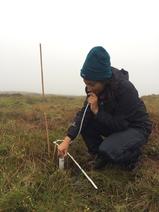Volunteer scientists are heading out across the Peak District National Park in the run up to Christmas to monitor how wet the ground is on our local moors.
The water level will be measured at 22 small ‘cluster’ areas across Kinder Scout and Bleaklow, as part of our annual dipwell project.

Dipwells are small wells which are set up in clusters across the moors. They are checked manually, by a team member who blows into a plastic tube as it is lowered into the well. When the tube reaches the water, bubbling is heard and the resulting depth is recorded.
This year’s campaign got underway on Thursday 5th October; 12 volunteers and 5 staff members will head out across the moors to measure the dipwells every Thursday for 12 weeks.
The dipwell campaign started back in 2010 as part of our Making Space for Water project, which came about after the summer flooding of 2007. DEFRA provided grant funding for the project, to look into how restoration of moorlands can contribute to reducing flood risk, including slowing the flow of water off the hills, while producing wider benefits for the environment and local residents, such as cleaner drinking water and a better habitat for wildlife.
This year’s results will feed into the research from the last seven years, to help us identify if our conservation work is successful at raising the water levels, known as ‘water tables’ across the moors, which is an important factor for keeping them in a favourable condition.
Shelini Kotecha is volunteering with the team whilst studying Ecology and Conservation at Manchester Metropolitan University. She said: “I like the fact that I am helping to add to an already very reliable data set that will contribute to long-term research into conservation efforts on the moors. It’s a really good experience and has helped me gain new skills whilst having fun!”
Following the last measurement being taken on Thursday 21st December (just in time for the team to warm up ready for Christmas!), we will do some initial processing of the data before it is sent off to The University of Manchester where scientists will undertake a more comprehensive analysis of the findings. Researchers will then send us a report which we hope to showcase to the volunteers who helped us to collect the data.
Find out about opportunities to get involved in our dipwell campaign.